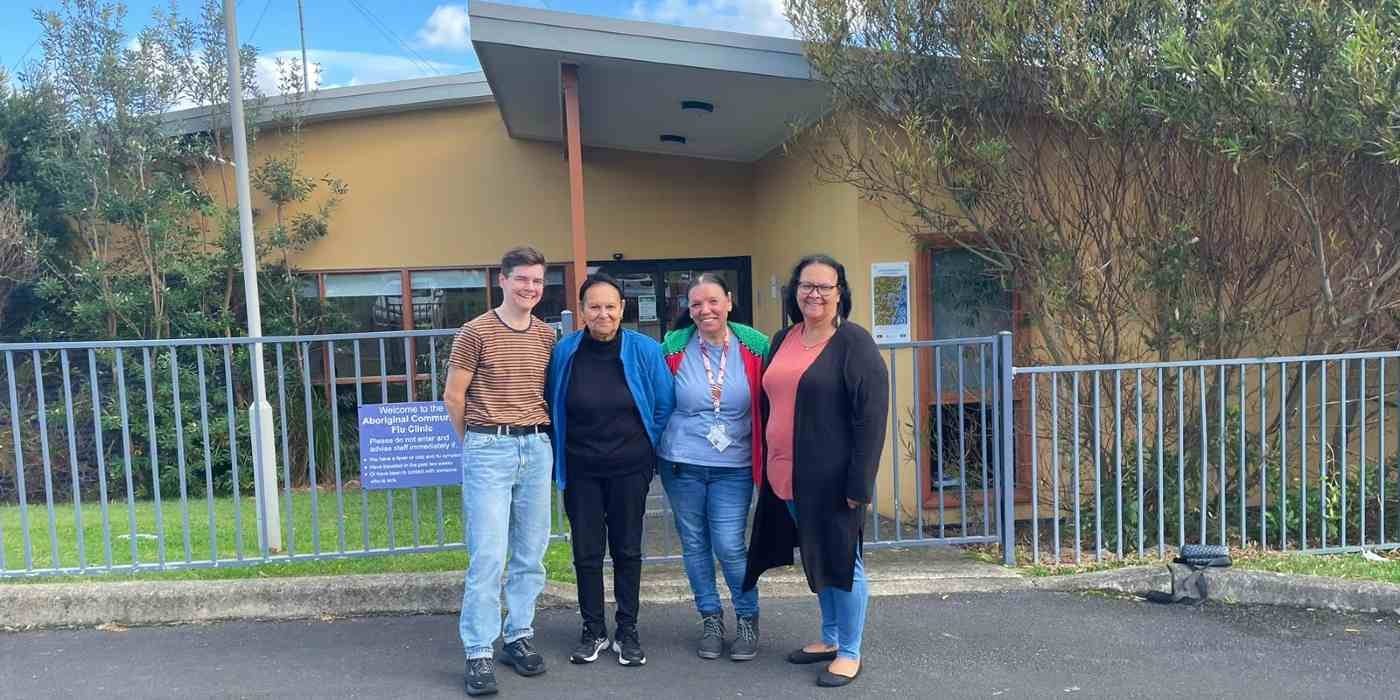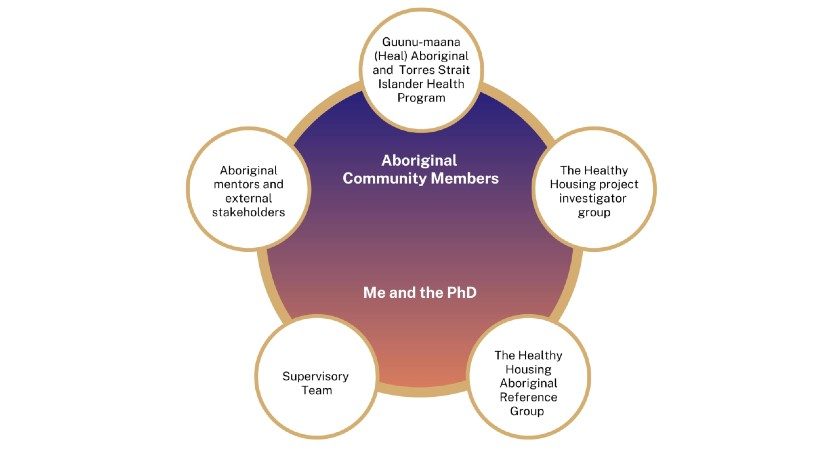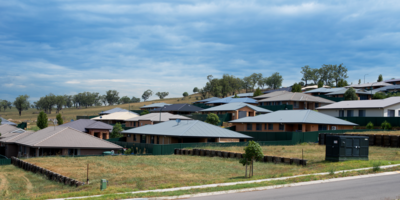
Relationships at the centre – research with Aboriginal and Torres Strait Islander people in urban social housing
Jacek Anderst (they/them) is a PhD Candidate at Guuna-maana (Heal) Aboriginal and Torres Strait Islander Health Program. Guided by Dharawal and Bidjigal community members, Jacek’s PhD explores meanings of home and desired outcomes of Aboriginal and Torres Strait Islander people living in social housing. They aim to broaden dominant understandings of home and housing so that Aboriginal and Torres Strait Islander social housing tenants come closer to what they need in housing and home, to support social and emotional wellbeing. Their research applies Indigenous research methodologies and methods (e.g. yarning) and qualitative research methods (e.g. semi-structured interviews), conducting research at the interface of two worldviews to develop new knowledge (interface methodology). Jacek is dedicated to research that reflects the lived experience of people for whom research is for, and apply equity, decolonising approaches and a relational way of working in all aspects of their research.
I’m a non-Aboriginal PhD Candidate exploring meanings of home and desired outcomes of Aboriginal and Torres Strait Islander people living in social housing in urban Sydney. I aim to learn from and meaningfully use this knowledge to develop resources for, and with, tenants.
I am often asked how my project came to be and how it is governed. This blog is for fellow researchers interested in Aboriginal and Torres Strait Islander health research.
Establishing the project
In 2021, building on existing relationships and before applying for a PhD scholarship, I spoke to Aboriginal community members living in social housing at La Perouse to ask their ideas for a research project.
“What would be useful for your community?” I asked. “What would you like to see?”
These conversations, and further discussions with Aboriginal and Torres Strait Islander researchers, provided the early shape and weight to my PhD aims and design. It was the beginnings of my governance structure that today is the spine and grounding force of the project.
My PhD is governed by Aboriginal and Torres Strait Islander people from community, healthcare and research. Western research projects often default decision-making power to researchers, or they apply a consumer engagement model where an advisory group is consulted at the start or at established intervals. The nature of my PhD topic and my positionality as a non-Aboriginal person calls for a very different approach. Aboriginal people with lived experience are experts with the right to substantial decision-making power and are investigators on the project.
Community-centred decision-making
I am guided by Aboriginal people with strong ties to the area and community where the research takes place: Bidjigal and Dharawal land (La Perouse and South East Sydney). They are busy women with many hats – Bidjigal and Dharawal women, Aboriginal Health Workers, mums, grandmothers and Aunties. They tirelessly advocate for their community and have experienced social housing issues first-hand.
I listen to them carefully: their ideas about what is best drives the PhD. Decisions are made together. Strong relationships and trust are crucial for this work. Giving space to people with lived experience and listening is Aboriginal governance in practice.
I should note that these relationships didn’t form overnight – we met in 2019 while I was a Research Associate on the Healthy Housing study. Since 2021, we’ve regularly connected over Zoom, at the La Perouse Aboriginal Community Health Centre, or over the phone to talk about everything from research questions to recruitment strategy and partnering in data collection and analyses, and we will continue to do so.
Cultural knowledge interwoven with academic oversight
Within the governance structure I am guided by Aboriginal supervisors Tamara Mackean and Julieann Coombes, whose cultural and intellectual knowledge is invaluable. My PhD requires working at the interface of First Nations and Western knowledge systems, applying Indigenous research methods such as yarning, and Western qualitative methods of semi-structured interviews.
My supervisors support me in my journey of understanding First Nations people’s ways of knowing, being and doing. Outside of the supervisory team, cultural mentors and researchers support this rich journey. Recently, in the lead-up to yarning with social housing tenants, I connected with two external researchers for advice on approaching yarning. While I can discuss this with my supervisors, there is strength in diversity, and as a non-Aboriginal researcher applying yarning for the first time, it’s important to listen to as many voices as possible. I also connect semi-regularly with Aboriginal healthcare and social workers of the Healthy Housing study to hear their perspectives on aspects of my project.
At The George Institute, my PhD sits within the Guunu-maana (Heal) Program as an institutional support structure. The team is incredibly supportive and we collaborate to ensure the interpretation of my findings are culturally relevant. For example, Aboriginal and Torres Strait Islander staff were involved in dual screening, data extraction, quality assessment, and provided integral feedback on analysis for a systematic scoping review on Aboriginal and Torres Strait Islander people’s meanings of home.
An Engagement Terms of Reference
My governance structure is held together on paper by an Engagement Terms of Reference, outlining each person’s role in the PhD. This is put into practice through respectful communication, regularly connecting and building trust. To help visualise engagement underlying the governance structure, I’ve worked with team members to design the diagram included below.
Relational work takes time and patience. Every time we connect, we share stories and learn more about one another. Together, we are working and living within colonial structures - from social housing providers to universities - but in our everyday and on the ground, we are accountable to one another and to the communities we belong to.
In this way, relationships are at the centre.



